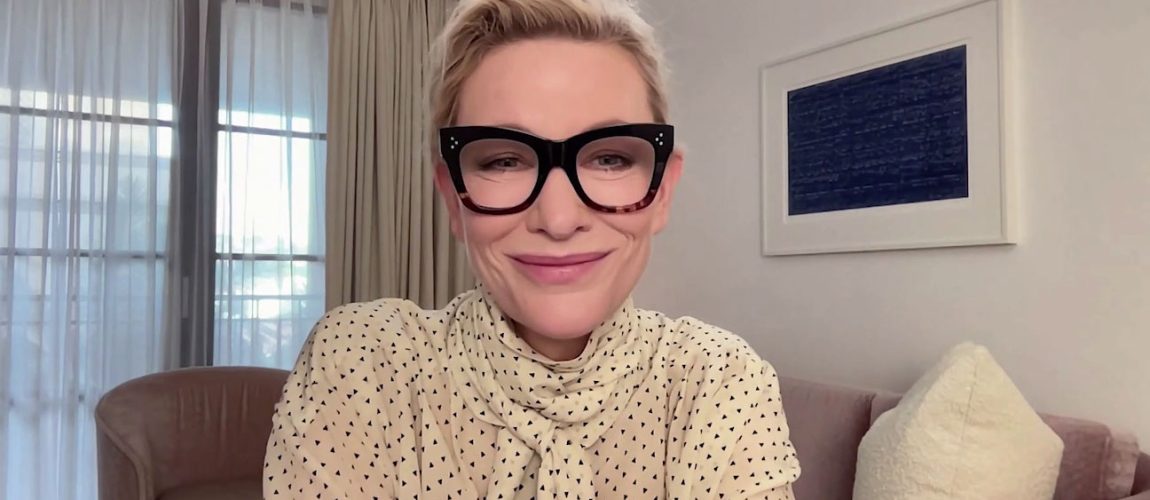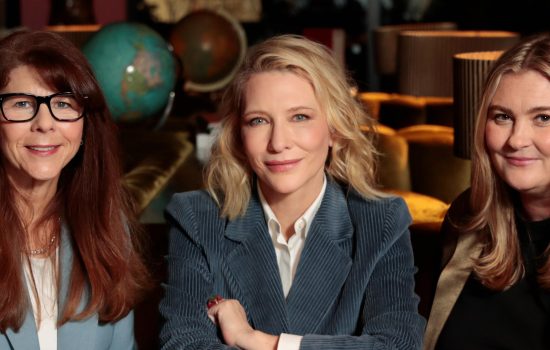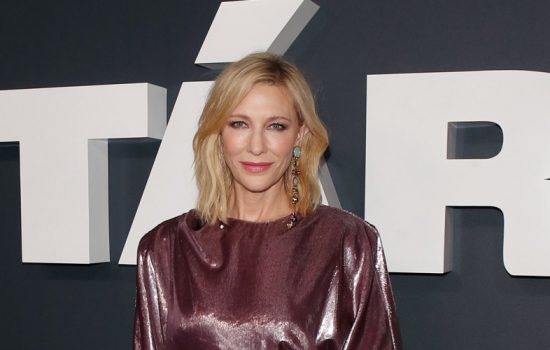BAFTA released the conversation with the Leading Actress nominees this year. Cate Blanchett is expected to attend the award ceremony this Sunday. The red carpet will be livestreamed on their BAFTA YouTube channel, the ceremony will begin at 17:45 GMT but will air 19:00 GMT on BBC One, then on BritBox for those who are in the US (14:00 ET/11:00 PT).
New interviews with Cate and TÁR conversations have also dropped, and check out the photos from Jimmy Kimmel Live!.




Cate Blanchett on how Tár tackles cancel culture and #MeToo
Lydia Tár is hardly a sympathetic figure. Did you think twice before taking on the role?
“Well, there’s two things that decide what I do and when I do it: four children, and what comes up. Recently, [the chance to work] with Adam McKay [on Don’t Look Up] and Guillermo [del Toro, on Nightmare Alley] finally came up.
“So, of course, that was what I did. I don’t know if that’s coming from theatre, but I don’t usually think. ‘Oh my gosh, look at all these lines to say,’ although that did cross my mind when I read this script!”
You learnt to play the piano as a child and took refresher lessons for this role. Did you also have to learn how to conduct?
“I will say from the get-go that the film is not about conducting – that’s something that Lydia Tár does like breathing. So I knew I had to find her way of breathing. I got really obsessed with [Austrian conductor] Carlos Kleiber and his tortured, ambivalent relationship to his work.
“And obviously, [groundbreaking female Dutch conductor] Antonia Brico’s mentioned, and I went back and looked at her. And Marin Alsop and Nathalie Stutzmann, who I’m completely obsessed with… And with my Australian compatriot Simone Young.”
Is this a reverse #MeToo story? A woman in a position of power who abuses it…
“No, no… I think that whole inclusion of #MeToo, and the reason the film grapples with #MeToo, is because unfortunately it’s still very relevant and present in the industry. [From the victims] there’s a lot of unexamined rage, and I think exploring that is part of the creative process.
“I’ve just been reading a book on female rage. It’s really interesting, as a woman, when you’re used to trying to work within an imperfect system – say the movie business – despite the problems, to find success. And then you realise in fact, will this system ever serve me? Or, instead, do I need to break the system apart?”
Lydia Tár is brought down by a public outcry — so is this a film about cancel culture?
“Of course [there’s] cancel culture… you could lump #MeToo in with that, but I think that’s a big generalisation. They’re two different things. Look, fundamentally, these issues are part of the world that we’re in at the moment. So, of course, themes like #MeToo and cancel culture will be tackled in a film like this.
“But they’re plot devices and textures from the real world, they’re not the only thing we’re talking about. It is, dare I say it, more existential than that.”
Is it right to cancel great artists because of their personal foibles?
“If you don’t read older books that are slightly offensive, because of what they say in a historical context, then you will never grapple with the minds of the time. So therefore, we are destined to repeat that stuff. The philosopher Schopenhauer… is his work extraordinary? Absolutely. You look at Picasso. You can only imagine what went on in, outside and around his studio.
“But do you look at Guernica and say that is one of the greatest works of art ever? Yes, it’s a fact. I think it’s important to have a healthy critique.”
You and your husband Andrew Upton were co-artistic directors of the Sydney Theatre Company for five years. Are people uncomfortable with women in positions of power?
“You have to know when and where to use that power. But as a woman, when you don’t wield your power – in the way we see men wield their power – then people think you don’t know what you’re doing, you don’t know what you think. And that happens a lot. You also see it on set, less and less so, but with female directors.”
You and Andrew were executive producers on the Australian film Shayda. Is it important for Aussies to stick together?
“Yes. When Andrew and I were running the Sydney Theatre Company (2008-13), we really enjoyed producing other people’s work. It can sometimes be ‘hard yakka’, as they say in Australia, to forge a career in the arts. It can be a bit brutal. So if you have a chance to scaffold and support people’s career development, I find that really rewarding.”
You’re also a goodwill ambassador for the United Nations High Commissioner for Refugees (UNHCR). Should actors speak out?
“If you find yourself with a platform, you can either use it for self-aggrandisement – which I do occasionally! – or to hopefully positive ends. Certainly, it’s been life-changing for myself and my family to be involved in UNHCR.”
How has it affected your family?
“Well, my husband and I don’t quarantine what we do from our children. We like to talk about it around the dinner table. Our son [Ignatius] came with us on a mission to Jordan, and just watching him play soccer with the boys in the Azraq camp… this one boy wouldn’t get up to play with him, and he said, ‘Does he not want to play?’
“And I said, ‘No, darling, he got shot and he still has shrapnel in his foot from when he was crossing from Syria to Jordan – he can’t walk properly.’ You could see him going, ‘That is so outside my experience.'”
Interview is Google translated from Greek to English
Cate Blanchett opens the door and, after sitting down herself first, invites us to sit with her on the floor on the thick carpet, since the furniture has been removed from the room to make room for the cameras. Her presence is glamorous and incredibly elegant, almost from another era and specifically from the golden age of Hollywood. Cate Blanchett, at 53 and already with two Oscars, is the epitome of the star: a creature born for the cinema, with alabaster skin and blue eyes, who can with incredible ease make it look sometimes mysterious and sometimes sad, depending with the direction of the director he’s working with – and she’s worked with the best, from Todd Haynes and Terrence Malick to Pedro Almodóvar. Her performance in Tár is enough to confirm that she deserves this recognition.
How did you approach this very complex yet exciting role?
Cate Blanchett: The film may be about a specific story, that of a mother and artist who was the first female conductor of a major orchestra, but it’s an existential, metaphysical film in a way. I was won over from the first moment I read the script, written wonderfully and with great precision by Todd Field. It is a multi-dimensional film. Regarding the creative process, we had to talk about the field of classical music of course, but not only about it. Tár is about power, its abuse and how it can change the people around you. Because we are talking about an entire system here.
Would you call Tár a “woman’s film”? Why do we see a woman ruling an entire system…
CB: A female movie? I’ve never thought of it that way. As an actor, I don’t think a character should be defined by their gender. The issue is more subtle than that. After all, a priori no one in real life asks this question: “Am I a man? Am I a woman?”. With the exception of those people whom society has not allowed to be what they would like to be. In these cases, obviously gender characteristics are incredibly important. I believe that these kinds of questions must immediately cease to exist and that we as humanity evolve in a common path without all these divisions that still threaten us. Politics and society too often divide us, when we should be united as individuals of the same species. By the way I say that I really like the allegory of the orchestra in the film: All its members must be coordinated and in perfect harmony for something beautiful to emerge. The question that arises is: Who is in charge of the orchestra? In Tár the character I play is the right person at the wrong time. In Karajan’s time it could perhaps be imposed in an authoritarian manner. But in 2023 music is a democratic process. The film also poses another question: How can one enforce one’s artistic vision without collateral damage? How can he create freely, respectfully and inclusively? How can cancel culture be handled by an artist in the field of classical music within contexts that have changed?Tár is an enigmatic character, a lesbian conductor, domineering, manipulative. How did you imagine her?
CB: It was all in Todd Field’s script, which is a very bold story. It’s full of little details that I focused on as an actor in order to build the material of the character. For example, Tár is the daughter of a deaf couple, so we conclude that she was formed in silence, and music is her education. She says she is turning 50, an age when people – and especially women – wonder what they have achieved in life. How much time does he have left? Has she made the right choices? Then, in the second part of the film, her career collapses. The film directly addresses the issue of precipitancy, precipitation, and even guilt, as Tár is accused of sexual abuse.
It’s hard not to think of the MeToo movement while watching the film. Could Tár be a man?
CB: First, it is certain that a conductor, whether male or female, embodies a natural authority, which is usually attributed to the male gender. He stands high on a pedestal with the eyes of all the members of the orchestra on him and is attached to his baguette. An orchestra conductor, a conductor is not allowed to show any sign of weakness, because he embodies leadership skills. What is interesting about the fact that Tár is a woman is that the issues of identity and the games of power and dominance appear from a different angle, a more raw one. The issue of abuse of power is raised, without the film giving a clear answer. I approached the character in the same way: without judging her. It is what it is, but, above all, it is the product of a system and a sequence of situations.
Tár is a powerful artist. What does this power mean for a famous star like you?
That’s what I am; I never think about it, I just wait for the next role. The power that fame gives you is short-lived. In my eyes it is insignificant.
Source: Radio Times, Madame Figaro Greece





 A Manual for Cleaning Women (202?)
A Manual for Cleaning Women (202?) Father Mother Brother Sister (2025)
Father Mother Brother Sister (2025)  Black Bag (2025)
Black Bag (2025)  The Seagull (2025)
The Seagull (2025) Bozo Over Roses (2025)
Bozo Over Roses (2025) Disclaimer (2024)
Disclaimer (2024)  Rumours (2024)
Rumours (2024)  Borderlands (2024)
Borderlands (2024)  The New Boy (2023)
The New Boy (2023) 











